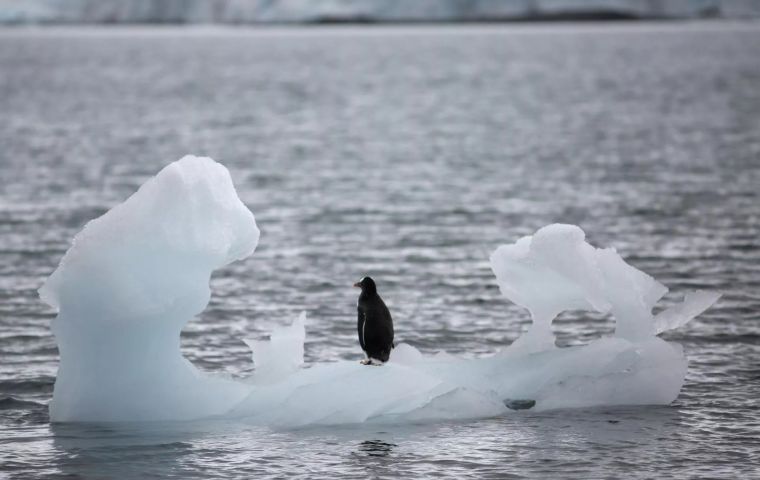MercoPress. South Atlantic News Agency
International team researching complex pattern of sea ice around Antarctica
 Antarctica sea ice was at its lowest extent in February 2022 – more than 1 million square kilometers less than the average
Antarctica sea ice was at its lowest extent in February 2022 – more than 1 million square kilometers less than the average A £5m project funded by the Natural Environment Research Council (NERC) to investigate the complex changes seen in sea ice around the Antarctic begins this month (March 2022) as the sea ice extent around the continent drops to a record low level.
Antarctic sea ice has shown a complex pattern of changes over recent decades having slowly increased in extent in the early part of this century before decreasing rapidly and reaching a record low level of 1.9 million square kilometers last month on 25 February, one million square kilometers below the long-term average – an area covering the size of Egypt.
Sea ice is an extremely important component of the Antarctic environment, through its role as a habitat for seabirds and marine mammals, and because of the part it plays in the global ocean circulation.
To advance scientists’ understanding of variability in Antarctic sea ice, NERC is funding a four-year study called Drivers and Effects of Fluctuations in sea Ice in the Antarctic (DEFIANT), involving major UK sea ice research groups and international partners. The project comprises fieldwork carried out from research ships and instrumented aircraft, satellite investigations and research with numerical models.
The first phase of fieldwork started this month with the departure of the German research vessel RV Polarstern, operated by the Alfred Wegener Institute, sailing towards the Weddell Sea. A team of scientists will deploy on-ice instruments to monitor sea ice through the coming winter and make sub-surface oceanographic measurements.
Dr Jeremy Wilkinson, a sea ice expert at the British Antarctic Survey and lead scientist of DEFIANT is working in the Weddell Sea now. He says: “It’s very timely for us to be starting our DEFIANT study at the moment the Antarctic has experienced the lowest sea ice minimum on record. We need to understand the myriad of factors influencing this year’s so we can make better prediction for future change.”
Professor John Turner, a meteorologist and sea ice expert at British Antarctic Survey, says: “While we’ve seen a steady decline of sea ice across the Arctic Ocean in recent decades, the picture in the Antarctic is much less clear. Sea extent is affected by many factors, including tropical climate variability, the decrease of stratospheric ozone (the ozone hole), high latitude ocean change and extreme storms at critical times of the year, making it difficult to explain the observed changes. The multi-disciplinary approach taken by DEFIANT will lead to major advances in our understanding of Antarctic sea ice and lead to improved predictions of how it will change in the future.”




Top Comments
Disclaimer & comment rulesCommenting for this story is now closed.
If you have a Facebook account, become a fan and comment on our Facebook Page!